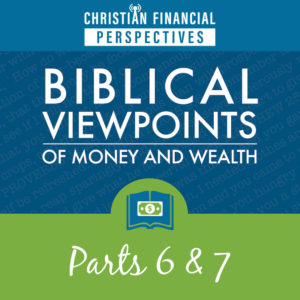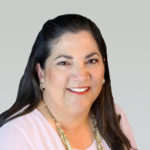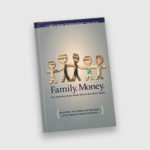Click below to listen to Episode 33 – Biblical Viewpoints of Money and Wealth Parts 6 and 7
Subscribe: Apple Podcasts | Google Podcasts | Spotify | Amazon Music | Stitcher | RSS | More
Biblical Viewpoints of Money and Wealth Parts 6 and 7
In this week’s show, Bob and Mary Jo wrap up our series called “Biblical Viewpoints of Money and Wealth”. This was originally designed as a Bible Study written by Bob Barber. The series is a deep dive into what God’s word has to say about money.
This entire series includes 7 viewpoints, of which the final 2 are covered on this episode.
Viewpoint #1
The Difference between a Biblical and Secular Worldview
Viewpoint #2
The Difference Between the Roles of the Owner (God) and the Manager (us)
and how our role is to be good stewards of the resources God has entrusted to us.
Viewpoint #3
The Biblical Worldview of Working and Retirement
Viewpoint #4
Secular and Biblical Counsel
Viewpoint #5
Money and Wealth
and how to accumulate wealth with biblical principles as well as invest it with values
Viewpoint #6
Giving and Blessings
Viewpoint #7
Leaving an Inheritance and a Legacy
If you would like to get the Bible study guide called “Biblical Viewpoints of Money and Wealth”, you can go to Amazon or call our office at 877-718-7884.
HOSTED BY: Bob Barber, CWS® and Mary Jo Lyons, CFP®
Mentioned In This Episode
Want to ask a question about your specific situation? Schedule a complimentary 15 minute phone call.
EPISODE TRANSCRIPT
[INTRODUCTION]
Bob: Welcome to Christian Financial Perspectives, a weekly podcast where we talk about ways to integrate your faith with your finances. This is Bob Barber.
Mary Jo: And I’m Mary Jo Lyons.
Bob: Are you ready to learn how to apply biblical wisdom to everyday financial decisions?
Mary Jo: Join us as we look at integrating your faith with your finances. If it’s your first time listening, welcome to our podcast, and if you’re a returning listener, welcome back.
[EPISODE]
Mary Jo:
In this week’s show, we wrap up our series called “Biblical Viewpoints of Money and Wealth”. This was originally designed as a Bible study and written by my co-host, Bob Barber. The series is a deep dive into what God’s word has to say about money. So we thought this would be a perfect topic to cover here on Christian Financial Perspectives. If you’d like to get the Bible study guide called “Biblical Viewpoints of Money and Wealth”, you can go to Amazon to order it. This series includes seven viewpoints. So Bob, let’s review the first viewpoints that we covered in our earlier sessions. The first of which also serves as a foundation.
Bob:
The first viewpoint, we really covered the difference between a biblical and secular worldview, which is the foundation for the entire Bible study of “Biblical Viewpoints of Money and Wealth”. And then in viewpoint number two, we looked at the difference between the roles of the owner, which is God, and the manager, which is us. And our role is to be good stewards of those resources God has entrusted to us. Viewpoint number three, we looked at the biblical worldview of working and retirement. Most people don’t realize it. The Bible has work written in the scriptures over 550 times, but only one time, and I mean just one time, for retirement, and it’s not at all the way we think of retirement here in America, but it has to do with mentoring those in the workforce that are younger. Then in the last podcast we covered viewpoints four and five, which viewpoint four is secular and biblical counsel and what is the difference in that? And using scriptural guidelines to look for somebody that’s going to help you in anything, whether it be financial planning or a CPA or an insurance advisor, anyone at all, that’s going to give you counsel and advice. Viewpoint number four is really a great study to go through in this Bible study. And then viewpoint number five last week was money and wealth and how to accumulate wealth with biblical principles, as well as how to invest with biblical principles.
Mary Jo:
If you missed the earlier episodes of “Biblical Viewpoints of Money and Wealth”, where we’ve gone over viewpoints 1 through 5, you can easily listen to them christianfinancialpodcast.com. And we’d also invite you to get an actual copy of the Bible study for yourself and those you love. It could totally change the way you think about money and wealth. In the last two biblical viewpoints for money and wealth that we’re going to cover today, we’re going to go over “Giving and Blessings” in number 6 and then number 7, “Leaving an Inheritance and a Legacy”.
Bob:
But before we get into these last two viewpoints, we’d like to set up some overarching principles for the entire Bible study of “Biblical Viewpoints of Money and Wealth”. The first one is is that all financial decisions are spiritual decisions, especially for a Christian, and need to be prayed about.
Mary Jo:
Our self-worth should not be associated with our net worth.
Bob:
We are managers, not owners.
Mary Jo:
And we are to manage it to glorify the owner.
Bob:
We are a conduit of wealth. Therefore it’s for flowing through us, not to stay in us and become like the Dead Sea where nothing grows.
Mary Jo:
And finally, wealth does not belong to us, but to God.
Bob:
So let’s get into today’s viewpoint number 6, “Giving and Blessings”. Mary Jo, you’ve got a good scripture to start us off with.
Mary Jo:
Acts 20:35, “In everything I showed you that by working hard in this manner, you must help the weak and remember the words of the Lord Jesus that he himself said, it is more blessed to give than to receive.”
Bob:
So that’s the big part right there, that last part. It’s more blessed to give than receive. Giving is listed over 1400 times in the Bible, and where it says that in Acts 20:35 that is more blessed to give than receive, this is certainly contrary to today’s consumer culture and the belief that it’s better to get than give. Mary Jo, why do you think it says it’s more blessed to give than receive?
Mary Jo:
Because when we’re giving it shows the heart of God, and it also helps release the chains of selfishness that we have at times. And we always want to hold on so tight to our stuff. Of course, some of us are more selfish than others, but we have to look at Jesus. Jesus was a giver. When he walked among us, sharing his teachings through the parables, there are numerous stories of his generous nature and acts of giving, and who doesn’t want to live and act like Jesus?
Bob:
I certainly want to live and act like Jesus did, Mary Jo, but I don’t think I want to die like he died because that was a very painful death. I’m glad he did that in our place.
Mary Jo:
I’m right there with you, Bob. I’m just thankful that he died for our sins and you’re right. I hope I don’t have to repeat that.
Bob:
So as we look at another scripture, let’s look at one on giving and actually how to give, which comes to us from Matthew 25:31-40. So here’s what it says, “When the son of man comes in glory and all the angels with him, then he will sit on his glorious throne. All the nations will be gathered before him and he will separate them from one another as the shepherd separates the sheep from the goats. And he will put the sheep on his right and the goats on his left. Then the King will say to those on his right, come you who are blessed of my father, inherit the kingdom prepared for you from the foundation of the world.” Okay, so these next two scriptures I want to emphasize, “For I was hungry and you gave me something to eat. I was thirsty and you gave me something to drink. I was a stranger and you invited me in. I was naked and you clothed me. I was sick and you visited me. I was in prison and you came to me.” Okay, verse 37, “Then the righteous will answer him, ‘Lord, when did we see you hungry and feed you or thirsty and give you something to drink? And when did we see you a stranger and invite you in or naked and clothe you? When did we see you sick or in prison and come to you?’ And the King will answer to him, ‘Truly I say to you, to the extent that you did to one of these brothers of mine, even the least of them, you did it for me.'”
Mary Jo:
What a perfect scripture, Bob. It points to the very fact that when we are helping others, we are finding and exercising the very heart of God and Jesus, the biggest giver of all time.
Bob:
So there’s a question here that all of us need to think about. Ponder on this question. What kind of eternal impact would you like to make with the assets and resources God has blessed you with?
Mary Jo:
So let’s look at these next two passages and see what the potential benefits of giving could be. In Proverbs 3:9-10, “Honor the Lord from your wealth and from the first of all your produce, so your barns will be filled with plenty and your vats will overflow with new wine.”
Bob:
Malachai 3:10-11, “Bring the whole tithe into the storehouse that there may be food in my house.” I’m going to say these next four words. It’s the only place we know of in scripture where it says this, “‘Test me in this,’ says the Lord almighty, ‘and see if I will not throw open the floodgates of heaven and pour out so much blessing that there will not be room enough to store it. I will prevent pests from devouring your crops and vines in your fields will not drop their fruit before it is ripe,’ Says the Lord almighty.” So as we look at these two scriptures, they’re really speaking to us and take those scriptures and apply them to today. Maybe we don’t have crops. Maybe we don’t have fruit trees, but there’s a principle here about tithing and giving and what can happen through that. And even saying you can test God in that because it’s the only place I know of in scripture that says that.
Mary Jo:
I didn’t realize that, Bob. That’s really interesting. Do you think the disciples ever tested him? Because he asked a lot of them and some of it was very new. I would imagine there were some doubters among them.
Bob:
Oh, absolutely. I think there’s a lot of doubters today when it comes to this, Mary Jo, because if you look at the church itself, tithing is actually only a small part of the congregation that is actually tithing. So, it’s really a step of faith, but this speaks into that how that step of faith can actually result in protection, and as you can see, prevent pass from devouring your crops.
Mary Jo:
To prevent those locust infestations. There is nothing like the joy that is felt when we give from our hearts. Giving doesn’t always have to be in the form of money, however. We can give our time and talents and other resources that God has gifted us with. And when you have an opportunity to sit quietly and reflect on today’s message, we would encourage you to give some thoughts about the many gifts that God has blessed you with. Make a list of at least 10 resources God has blessed you with that can help others while bringing glory to God.
Bob:
I love that, Mary Jo. That is a great exercise to do. I want to repeat that, make a list of at least 10 resources God has blessed you with that could help others while bringing glory to God. Mary Jo, when we start to write down the things that are blessings, it sure does give you a different perspective in life.
Mary Jo:
It just makes them so much more real.
Bob:
It does. And there’s a positivity that comes with that when we have so much negative going on around the world. So I want to look at giving right now, and this next verse is a little bit different perspective because while giving is so important and is a great thing to do, actually the Bible gives us a warning about giving with a wrong motive. So let’s look at Matthew 6:1-4 if you’ll read that for us, Mary Jo.
Mary Jo:
“Beware of practicing your righteousness before men to be noticed by them. Otherwise, you have no reward with your father who is in heaven. So when you give to the poor, do not sound a trumpet before you, as the hypocrites do in the synagogues and in the streets so that they may be honored by men. Truly, I say to you, they have their reward in full, but when you give to the poor, do not let your left hand know what your right hand is doing so that your giving will be in secret and your father who sees what is done in secret will reward you.”
Bob:
It’s giving us a warning about giving, and what is that warning?
Mary Jo:
Well, I think all giving is good. However, we would caution you to think about how you give, if it’s done in a public way that brings the attention to the giver rather than the gift and the cause, then what is the gift really about? Is it about giving from the heart and true generosity, or is it a publicity stunt to draw to the giver? I’m thinking that it isn’t what God really had in mind. What do you think?
Bob:
I think that’s exactly right. I agree with you that when we’re giving it should be done with a right heart that we’re giving, we’re not giving to get. We’re giving to give. Make sense?
Mary Jo:
Right. And I think in this day and age with social media there are so many celebrities out there that give so publicly. It’s part of their branding. Again, I’m not sure that it’s done within the right intentions. I’m not in anyone’s heart, so I don’t want to second guess them, but when it is done so publicly to me, it’s a PR stunt, and it isn’t a real true gift, if that makes sense.
Bob:
It does. But of course we do want to say that it’s still wonderful that people are giving. We just want it to be done with the right motive. So we’re going to come into a little bit different thing about giving now, too, that maybe you’ve never thought about because maybe some of you are listening and you’re like, if you look at my budget and paying for the kids and college and the tithe that I’m giving, I just don’t have anything left, but most people don’t really think about what I’m going to mention. So I’m going to say think differently about your giving today. Here’s a quote. Did you know that 90% of giving today is only from what most people had in cash in their bank account? Yet, most of us have 20% or less of our assets there, but 10% of our giving today is from assets other than cash. Yet, this is where 80% of our resources are.
Mary Jo:
So many people have more than just cash. There are interesting ways, creative ways, that they can use these to help fund their gifts. And to name just a few of these non-cash assets, these are things like real estate, investment properties, raw land that’s undeveloped, stocks and bonds and these are stocks and bonds that are held in certificate form, retirement plans, collectibles like art, coins, and even guns, classic cars, an interest in a business. How many people do you know that have a car sitting in a garage covered under a tarp that they’re not driving, and it’s really just taking up space.
Bob:
Maybe just some old antiques or some art, like you said, collectibles like art. I mean, that can be worth a lot and it’s really not doing anything. And you could take that and turn that into what I call living water.
Mary Jo:
Right. And so many of our seniors, we have these things and they’re meaningful to us. I just put myself in that bucket of seniors. I’m not sure what that says, but our kids in the next generation, they may not even want those things. Using them as your current gifting strategies, there might be something to that that would be beneficial.
Bob:
When we mention the retirement plans, that does speak a lot to those that are above 70.5 and have a required distribution or what we call an RMD. And you can give that RMD directly to 501c3 charitable organizations without declaring that as income. And it makes so much sense to go directly from the retirement plan to the charity versus taking money out of the retirement plan and then giving cash to the charity.
Mary Jo:
Absolutely, Bob. Great reminder.
Bob:
So there’s also four different ways we can give today. First is the traditional of give it outright. Examples include cash or highly appreciated assets like a stock instead of cash. Next would be give it later. Examples include a percentage of an estate plan. Like maybe in your will you put your church or some favorite ministries as a percentage of your estate plan or listing a nonprofit as the beneficiary of a retirement plan, like an IRA, 401k, 403b or annuity after you and your spouse are gone. This is a really great example of giving it later, and it doesn’t hurt at all right now.
Mary Jo:
And you can give the income from an asset like rental property, a bank CD, or stock dividend, but keep the asset for yourself and just give the income. You can give an asset like real estate or business or a stock, but keep the income generated for your lifetime. Examples of this include a charitable gift annuity or charitable remainder trust. And if you have questions on those, Bob and I can help walk you through those and all the various options that are available to you.
Bob:
There really is a ripple effect of giving. Giving multiplies when it flows from God, through us, to others. But when we don’t give, it stops the ripple of influence of giving. Giving generously not only helps you, it teaches others, as well as the following generations to be generous givers. God gives. We receive. We give a portion of it away. Others receive. They give, and the ripple effect of giving continues.
Mary Jo:
Now, we’re going to jump into viewpoint number seven, “wisely leaving an inheritance and creating a legacy”. First, let’s look to scripture for some insight. Bob, I know you had a couple of favorites.
Bob:
Yes I do. And I’m quoting this one all the time. Proverbs 20:21, “An inheritance gained quickly at the beginning will not be blessed in the end,” and Proverbs 13:22, “A good person leaves an inheritance for their children’s children, but a sinner’s wealth is stored up for the righteous.” Mary Jo, there are so many great scriptures that support today’s topic. Did you have a couple you’d like to share also?
Mary Jo:
I sure do. 1 Chronicles 28:8, “Be careful to follow all the commands of the Lord your God, that you may possess this good land and pass it on as an inheritance to your descendants forever.” And then from Ecclesiastes 7:11, “Wisdom, like an inheritance, is a good thing and benefits those who see the sun.”
Bob:
Oh, we’re going to talk about that one later, because wisdom, if you pass an inheritance without wisdom, watch out. You know what? Inheritance appears in the scriptures over 200 times, and it’s not always in the context of material assets, but many times it’s referred to as the values that are being passed down from one generation to another, and Matthew 6:19-21, there’s a warning, “Do not store up treasures here on earth where moths eat them and rust destroys them and where thieves break in and steal, but store up your treasures in heaven, where moths and rust cannot destroy and thieves do not break in and steal. Wherever your treasure is, there the desires of your heart will be also.”
Mary Jo:
So Bob, what are three things that you think most parents would like their children and grandchildren to inherit that are not associated with money, wealth, or anything that can rust or burn? Listeners, think about what these might be for your family. For my family, they are creating a life of service to those in need, passing down a love for God and the benefits of living a Christian lifestyle, and caring for all those that are entrusted to my care as I would want to be cared for. I take seriously my responsibility of raising young children to become productive citizens and good stewards of their God-given resources and especially caring for our aging parents. That’s certainly something that I want to leave as a legacy, kind of a how to.
Bob:
I think those are really three wonderful things. Deuteronomy 5:6-9 says, “You shall love the Lord your God with all your heart and with all your soul and with all your mind. These words, which I command you today, shall be on your heart.” Now, here it comes. “You shall teach them diligently to your sons and should talk of them when you sit in your house and when you walk by the way and when you lie down and when you rise up. You shall bind them as a sign on your hand and they shall be as frontals on your forehead. You shall write them on the doorpost of your house and on your gates.” What a great spiritual inheritance we want to pass. This scripture’s telling us onto the following generations where they see that God and his word is so tied into everything that you live and the way you talk and everything that you do that that’s passed on to those following generations.
Mary Jo:
Bob, I think that there are several goals of every Christian family when passing down an inheritance. I think a few of those should be wisdom first, then second godly principles, and then number three, that monetary inheritance will not enable bad behavior. We can’t always help that, but we can do a lot to prevent it.
Bob:
And I want people to really understand the order that you said that in. You notice you didn’t say the monetary inheritance first, but you said wisdom first and then godly principles.
Mary Jo:
Well, it just goes to what you said about wisdom before money.
Bob:
Well, you’re setting your children up for a disaster if all you’re passing on is a monetary inheritance and they don’t have the wisdom and the Godly insight to be able to handle that inheritance with wisdom.
Mary Jo:
That’s right, Bob.
Bob:
Up until the last 50 years, what was interesting, Mary Jo, land was what was passed down most of the time as that inheritance from one generation to another, instead of just money. And you think about this, if only land was received and not sold, what were the heirs who inherited the land have to do with it if they wanted to get anything from it?
Mary Jo:
They’d have to work it.
Bob:
They would have to work it to make anything from that land. A few indications that your heirs are ready to inherit money and wealth are 1) Your heirs have proven that they know how to save money and are already on their own path to accumulating wealth wisely; 2) They’re debt-free or have very little debt, maybe possibly for a home.
Mary Jo:
And 3) They are wise consumers. They have conservative spending habits and track where their money is going; and 4) they show they are giving of their time, money, and resources to charitable causes.
Bob:
So one of the things that we like to talk about is with your kids and grandkids, when it comes to inheritance is doing a pre inheritance experience. One of the ways that many parents or grandparents see if their heirs are prepared for their financial inheritance is by doing that experience where they give a little bit and see how they handle it. This comes from the principles that we find in the parable of the talents.
Mary Jo:
It also makes me think about what we said earlier in today’s episode about Jesus testing us. This is a way for parents to test and see if the next generation is ready. A pre inheritance experience uses the principles from the parable of the talents from Matthew 25:14-25. This is done by giving your heirs a very small percentage of their inheritance in increments while you are still alive. Then coming back to them a few months later and seeing what they did with the money. If they were wise with a small portion of their inheritance, they may be prepared for a larger portion.
Bob:
This is really following a biblical guideline. As we see in Luke 16:10-11, “Whoever can be trusted with very little can also be trusted with much and whoever is dishonest with very little will also be dishonest with much.” So if you’ve not been trustworthy in handling worldly wealth, who will trust you with true riches.
Mary Jo:
Remember, when we talk about legacy planning, it’s not just about leaving money as an inheritance. It’s also about creating a spiritual legacy and a family heritage.
Bob:
If you were fortunate enough to have known your grandparents, even great grandparents, can you name some of the things they loved to do besides just passing the money down to you? For me, I remember my grandparents, they loved riding horses and tending to the cattle. I remember with my grandfather, he loved going to rodeos and going to a baseball game. I remember sitting out on their large porch at night and visiting with family, friends, and neighbors. And this was fun, going to the big city for them, which was Luling or Lockhart or San Marcos, Texas every once in awhile. And well, when they would go to the “big city”, they never would go to Austin or San Antonio, but when they would go to the big city of Luling or Lockhart, which even today is less than 10,000 people.
Mary Jo:
I was going to say, I don’t ever think of Luling as being the big city.
Bob:
We would always have to go to Lockhart and get some good barbecue or to Luling to the City Market, or we’d have to go to Dairy Queen. They just made an event of that. And it was so funny. Those are the things I remember. I hope that all of us have those kinds of memories with our grandparents. I know you have some you want to share.
Mary Jo:
I do. And Bob, as you were mentioning Luling, did you ever go to the watermelon spitting contest? Isn’t that what they do in Luling?
Bob:
Oh, I’ve been to the watermelon thump many times.
Mary Jo:
My grandparents, they lived across the country, and they died when I was really young, so I don’t have a lot of memories of them, but I had a great uncle that was very much like a grandfather to me. And he lived in the Rio Grande Valley. He was responsible for designing a lot of the irrigation systems in the orchards back in the fifties. And he was this big, tall Texan. He wore a cowboy hat and smoked a pipe. And for me, when I was young, he was bigger than life. My aunt and he, they had this big dining room that held this big, massive round dining table that they had custom made for their ranch. And it was made of solid Oak and it fit 12 people around it with these big captain’s chairs. It was really huge. And in the middle, there was this lazy susan for passing food around. He loved breaking bread together, sharing a meal with his family. That was kind of one of my best memories of childhood. It could be that my brothers and sisters and I would just sit there and spin that lazy susan around and see if we could get the platters of food to fly off, but that might be another podcast.
Bob:
Mary Jo, I think people will have the impression that you and me truly are Texan.
Mary Jo:
Absolutely. To the core.
Bob:
These things are so important to write down because it’s so important that generations from now know so much more than just a monetary inheritance they may get. But what was the lifestyle of grandpa and great grandpa and great grandma? Mary Jo, you’ve heard me speak here. I go back many generations in Texas. I go all the way back to 1830, and I’m a sixth generation Texan. I can name all those generations, and I hope that my great-grandchildren or great-great-grandchildren can do the same thing. So the question is to those of you that are listening, would you like multiple generations from now to be able to answer the last question that we presented with ease about you? What were the things that you liked to do? How many generations can you trace back your family tree, and today with all the internet and with ancestry.com, it’s made it a lot easier and people are doing the DNA tests because they want to see where they come from and what is their inheritance.
Mary Jo:
My sister just did that and she shared with me our background, and we have French in there. We’re very European, which I didn’t know. So we always thought that we had a small fraction of Indian heritage, but that was not true in what she got back from ancestry.
Bob:
If you go to mine, all you’re going to find is Texan.
Mary Jo:
We just want our listeners to take a minute and go through this. Make a mental list of the three meaningful characteristics you would like to be remembered for 25 or 30 years after you’re gone. For example, for me, I’d like to be remembered for a few things. She was a giver, generous with her time and her talents, and she was a good and faithful steward of what God gifted her with. She was a devoted wife, daughter, and sister, always putting her family first. But I guess most importantly, I’d like to be remembered for my faith, my love for the Lord.
Bob:
Amen, and I say the same thing. I hope that is what I’m remembered for, that I was a Godly man. So how are you going to ensure these characteristics are remembered? Think about what would you like to have written on your gravestone.
Mary Jo:
In Psalm 78:5-7, what can you do to help the following generations in your family to follow God? And to dive much deeper into today’s topic, we highly suggest reading the book called “Family.Money.” And this was written by David Wills, Terry Parker, and Greg Sperry of the National Christian Foundation. So, it’s a great little book and we really encourage you to pick up a copy.
Bob:
In today’s episode, we have covered some really weighty topics that deserve pondering and some quiet time of reflection. And you can purchase a copy of the Bible study, “Biblical Viewpoints of Money and Wealth” on amazon.com.
[DISCLOSURES]
Comments from today’s show are for informational purposes only and not to be considered investment advice or recommendations to buy or sell any company that may have been mentioned or discussed. The opinions expressed are solely those of the hosts, Bob Barber and Mary Jo Lyons. Bob and Mary Jo do not provide tax advice and encourage you to seek guidance from a tax professional. Investment advisory services offered through Christian Investment Advisors Inc. DBA Christian Financial Advisors, a registered investment advisor.













